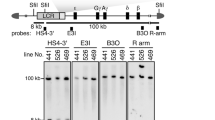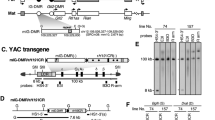Abstract
Differential modifications of the genome during gametogenesis result in a functional difference between the paternal and maternal genomes at the moment of fertilization1–4. A possible cause of this imprinting is the methylation of DNA5,6. The insertion of foreign DNA into transgenic mice allows the tagging of regions that are differentially methylated during gametogenesis. We describe here a transgenic mouse strain in which the expression of the hepatitis B surface antigen gene is irreversibly repressed following its passage through the female germ line. This inhibition is accompanied by the methylation of all the HpaII and HhaI sites within the foreign gene, which we have shown to be integrated into a site on chromosome 13. The irreversibility reported here contrasts with what is found with other transgenic mice sequences which are reversibly methylated after passage through the male or female germ line7,8, though in both cases methylation appears to be important in the imprinting process.
Similar content being viewed by others
References
Surani, M. A. H. & Barton, S. C. Nature 308, 548–550 (1984).
McGrath, J. & Solter, D. Cell 37, 179–183 (1984).
Cattanach, B. M. & Kirk, M. Nature 315, 496–498 (1985).
Surani, M. A. H., Barton, S. C. & Norris, M. L. Nature 326, 395–397 (1987).
Surani, M. A. H., Barton, S. C. & Norris, M. L. Cell 45, 127–136 (1986).
McGrath, J. & Solter, D. Nature 308, 550–551 (1984).
Reik, W., Collick, A., Norris, M. L., Barton, S. C. & Surani, M. A. Nature 328, 248–251 (1987).
Sapienza, C., Peterson, A. C., Rossant, J. & Balling, R. Nature 328, 251–254 (1987).
Babinet, C., Farza, H., Morello, D., Hadchouel, M. & Pourcel, C. Science 230, 1160–1163 (1985).
Robert, B. et al. Nature 314, 181–183 (1985).
Guenet, J. L. Curr. Topics microbiol. Immun. 127, 109–113 (1986).
Jaenisch, R. & Jähner, D. Biochim. biophys. Acta 782, 1–9 (1984).
Lyon, M. F., Ward, H. C. & Simpson, G. M. Genet. Res. 29, 83–92 (1976).
Lyon, M. F. in Radiation-Induced Damage in Man (ed. Ishihara, T.) 327–346 (Liss, New York, 1983).
Jaenisch, R. et al. Cell 24, 519–529 (1981).
Author information
Authors and Affiliations
Rights and permissions
About this article
Cite this article
Hadchouel, M., Farza, H., Simon, D. et al. Maternal inhibition of hepatitis B surface antigen gene expression in transgenic mice correlates with de novo methylation. Nature 329, 454–456 (1987). https://doi.org/10.1038/329454a0
Received:
Accepted:
Issue Date:
DOI: https://doi.org/10.1038/329454a0
- Springer Nature Limited
This article is cited by
-
Epigenetic Inheritance of Disease and Disease Risk
Neuropsychopharmacology (2013)
-
No evidence for cumulative effects in a Dnmt3b hypomorph across multiple generations
Mammalian Genome (2013)
-
Understanding transgenerational epigenetic inheritance via the gametes in mammals
Nature Reviews Genetics (2012)
-
The case for transgenerational epigenetic inheritance in humans
Mammalian Genome (2008)
-
Epigenetic inheritance at the agouti locus in the mouse
Nature Genetics (1999)





